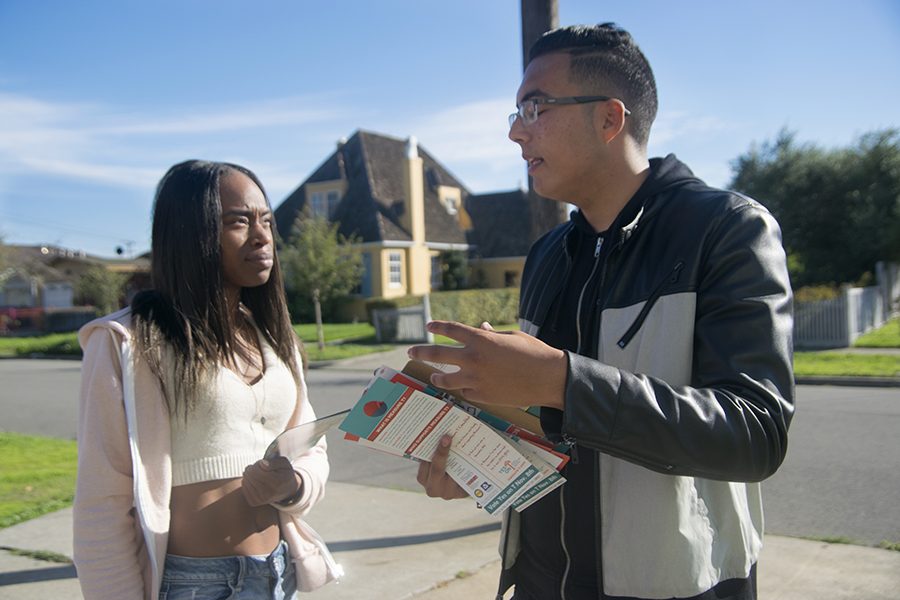Group tracks school board
Dec 7, 2016
By voicing their educational concerns to public officials and holding them accountable, they plan to improve the opportunities for students in generations to come.
Students For Education Reform (SFER) is a non-profit 501 (c)(3) organization with over 100 chapters on college campuses throughout the nation that aims to create change in education and in their communities.
Contra Costa College’s SFER chapter members to learn about the political and electoral process when electing the West Contra Costa County candidates for the K-12 school board.
“We have the lowest performing district in the state of California (in scholastic achievement), and we want to help these students. We want to develop ourselves also, but that’s not enough. We want to give other students the opportunity to develop their voices,” SFER Lead Organizer and political science major at CCC, Luis Ledesma said.
“Our main goal is equality and education for all students regardless of their background,” Ledesma said.
SFER’s partner organization, SFER Action Network, is non-profit 501(c)4 organization made up of trained student leaders who demand policy change and seek to hold elected leaders accountable for decisions that affect historically low-income communities.
Sociology major and SFER program coordinator Raquel Antolin said when students’ voices come together for a cause, it is “extremely” powerful.
Ledesma said members of SFER attend board meetings on Wednesdays at Lovonya Dejean Middle School and analyze how the board members respond to the public. They then gather information about the board members and hold them accountable for ways to make education more accessible for all students.
“We are action oriented,” Antolin said.
Ledesma said one of the issues SFER focuses on is the school-to-prison pipeline.
“The school-to-prison pipeline is real.
“There are policies that target predominantly Latino and black students. There is a policy called zero-tolerance and it has proven to suspend and expel black and Latinos three time more likely than other students. That criminalizes our students and enforces police action with student problems.”
A zero tolerance policy is a school or district policy that mandates punishment for minor behaviors, and often students of diverse racial, ethnic or economic backgrounds receive these punishments.
Ledesma said these small policies (like zero tolerance policies) put these students into the system and it leads up to the school-to-prison pipeline.
Antolin said, “We are pushing our children into the prison system, instead of higher education. Students are getting suspended for minor things like bringing nail clippers to school.”
Antolin said other methods of correction should be used to reach students in the K-12 system.
“The reality of our low-income students is that their parents work all day, (students) come from homes of addictions. They go to the streets and get into trouble,” she said.
“Once you get into the (juvenile justice) system, it’s hard to get out.”
Antolin said having police cars parked nearby or outside of high school campuses is sending bad messages about the campus and its students.
Antolin said, “There are a large percentage of our schools not serving our students, particularly those students from unprivileged backgrounds.”
Ledesma said one of SFER Action Network’s goals semester was to help elect West Contra Costa Unified School District candidates Miriam Stephanie and Tom Panas.
“We felt these two candidates fit more with our mission.”
Through a community panel within SFER Action Network, the candidates were invited for a conversation about their plans in the WCCUSD. Antolin said SFER Action Network endorses candidates based on their stances.
Communications for Students for Education Reform Action Network Debbie Fine Edelberg said, “A lot of people don’t understand the role of the school board.”
But she said the decisions made by the school board impact the lives of students directly.
A school board member is an elected public official trusted to govern a public school.
Edelberg said SFER Action Network members receive coaching to advocate for students and to get involved in the community.
Antolin said, “We believe that in order for our students to make a change, our students have to advocate for other students.
“We have been graduates to the K-12 system and are now in college, and we should
advocate for improved education outcomes with powerful voices for the next generation who just want a quality education system.”
Ledesma said CCC’s SFER chapter has about 80 people who have signed a pledge card that says, “I support SFER.”
Members of SFER start off as supporters, and in order to be a member they must go to school board meetings and participate in community events.



